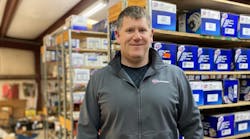As a pioneering trainer addressing parts and services for electric vehicles (EVs), in addition to educating civilian industry participants, Craig Van Batenburg has conducted numerous sessions for government employees and military personnel assigned to oversee an ever-expanding array of EV fleet applications that include both plug-ins and hybrids.
ACDC has presented EV repair and engineering classes at American military bases all over the world, especially at Air Force facilities where research into new ground-based transportation technologies is an ongoing mission.
“We’re worldwide with every branch” of the service, plus other government entities such as Homeland Security, he says, telling Aftermarket Business World that he has recently been contacted again by the U.S. Navy seeking his expertise about an automotive topic to be disclosed during further consultations. “It’s top secret, so I don’t know what it is yet – but I think it’s about high-voltage packs.”
Some 15,000 technicians and other civilian, governmental and military commanders and managers have received EV instruction from Van Batenburg in more than seven countries and 46 states.
He recently answered a series of questions about aftermarket education and opportunities within the EV segment:
Q: Aren’t most, if not all, EVs still under dealer warranties?
A: No. Most warranties vary in their length and mileage for all types of cars.
Q: Then there are sales opportunities available now? How do you assess the level of acceptance by aftermarket businesses gearing up to provide EV parts and services?
A: It depends on who you ask. Midwestern guys don’t see it coming; if you ask a supplier on the East Coast or West Coast they totally get it – if you’re on the East Coast or West Coast you risk being left behind your competitors if you don’t learn about this.
Q: How soon do you anticipate that the aftermarket can glean significant sales within the EV segment?
A: No one’s looking for a date; they’re not even flirting with us. It is a market that is going back to the dealership for repairs, about 92 percent of the business. ACDC exists to keep independent shops in business, and if you don’t work hard at it you’ll remain at 8 percent of EV parts and services sales.
Q: So now is the time to seek out EV training?
A: Yes! The initial training is 100 hours, and the longer you wait the steeper the climb. Three years from now it will be 130 hours of training – every year you wait it takes longer to get caught up with the technology.
Q: What are some of the aftermarket EV components that you see as having the most sales potential?
A: Batteries are No. 1. After batteries, you have high-voltage parts that fail; inverters, DC-DC converters, electric motors and regenerative braking components. It’s like a four-channel ABS system, and a lot of them are getting old. Hybrid cars have gas engines, so they have every problem that gasoline cars have.
Q: Given the dominance of dealer service centers, is it worthwhile for independent repairers to implement EV repairs and the accompanying marketing measures at this point?
A: Yes! It is wide open for the smart independent shop. To offer repairs to electric car owners you should offer free electric car charging. That will bring people right to your door.
Q: What are some of the key upgrades that shop owners need to make for accommodating EV repairs?
A: You would have to get some good scan tools, safety equipment, training obviously, and if you want to work on pure electric cars you need a charger and a battery lift fixture. The battery is so very heavy that you need the lift fixture for the safety of your employees.
Q: What are some of the cost figures involved with this?
A: If you already have a well-equipped shop it’s under $6,000 for working on hybrids. It takes $5,000 to train a single technician over the course of a year. We recommend that two technicians are trained at a time. A technician may go on vacation or leave for another job, and then you’d be stuck.
Q: Do you offer training for owners, managers and counter people at warehouses and retailers?
A: We provide classes onsite, online and at our training center in Worcester, Mass., and I’ve written two books and am working on a third.
Do you anticipate much of a DIYer market for EV parts, or is this mainly a DIFM domain?
A: There’s a market out there for DIYers. If you go on YouTube there are videos of people rebuilding battery packs. We’re engaged with DIY EV owners – helping them find an aftermarket shop (to provide expert advice and assistance). When I had my own shop, I worked with a lot of do-it-yourselfers: “Bring your car in and I’ll finish it for you.”
If you own a parts store you can put some EV stuff on the shelf and see if it sells. But once you start placing them you should keep the parts in stock. A customer is not going to wait three days for a part.
And you need to advertise that you have them. I’ve never walked into a parts store yet that has a sign that says, “Hybrid Parts Here.”
Q: Do you offer training for fuel cell vehicles?
A: Yes. We’ve taught a few classes on fuel cells already. Right now, though, fuel cells are so new that you wouldn’t replace a single component; you’d replace an entire system, and there are big warranties on these systems. Check back in a year or two and we’ll see what is happening.
Subscribe to Aftermarket Business World and receive articles like this every month….absolutely free. Click here.


